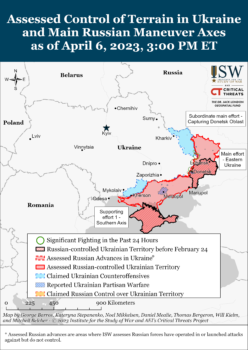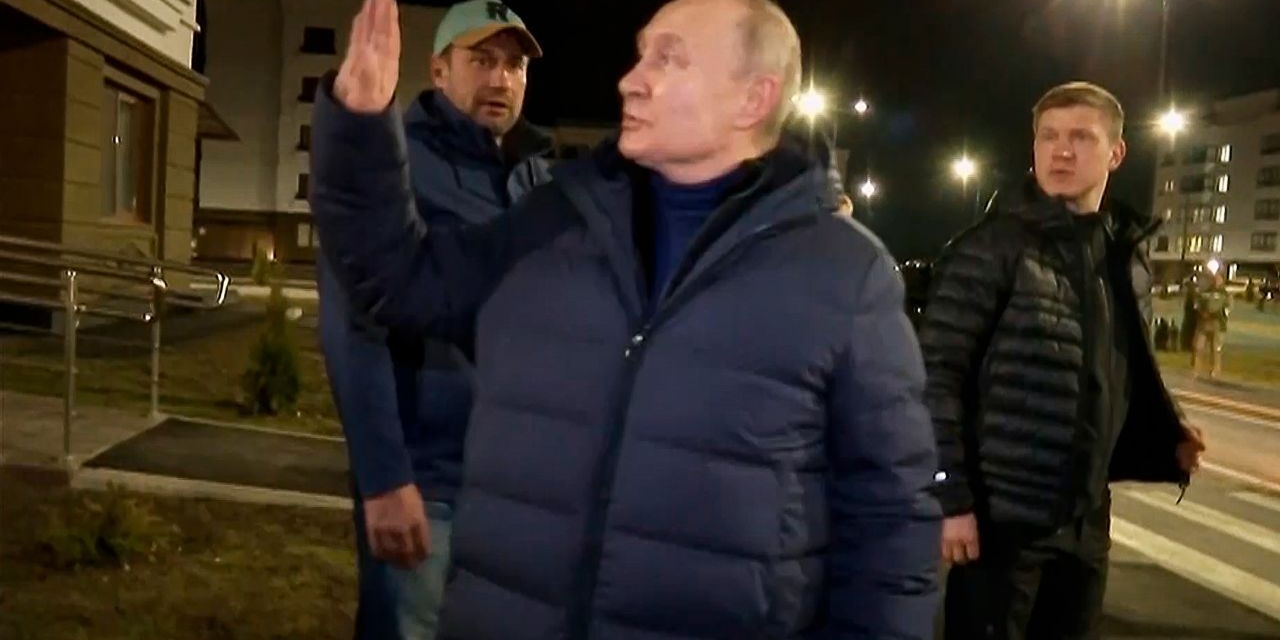Vladimir Putin in Russian-occupied Mariupol in southern Ukraine, March 19, 2023
Monday’s Coverage: China’s Defense Minister Meets Putin in Moscow

Map: Institute for the Study of War
UPDATE 1704 GMT:
Poland says it will resume imports of Ukraine’s grain and other foodstuffs from Friday, following two days of talks with Ukrainian officials.
Agriculture Minister Robert Telus announced the lifting of the temporary ban, which had been put in place last week to last until June 30 (see 0631 GMT).
“We managed to create such mechanisms that will ensure that not a single ton of grain will remain in Poland,” Telus told journalists.
UPDATE 1638 GMT:
The makers of Absolut vodka are halting all exports to Russia amid calls to boycott the brand in Sweden and on social media.
Stephanie Durroux, the chief executive of the Absolut Company, said the firm is exercising its “duty of care” towards employees and partners: “We cannot expose them to massive criticism in all forms.”
The owner of Absolut, Pernod Ricard, confirmed earlier this month that it had resumed some exports to Russia after halting them in March 2022, soon after Vladimir Putin launched the invasion of Ukraine.
Pernod Ricard said the resumption of exports was made in part to protect staff in Russia from “criminal liability” and accusations of “intentional bankruptcy”.
UPDATE 1623 GMT:
Ukraine President Volodymyr Zelenskiy has visited troops in Avdiivka, near the frontline in the Donetsk region in eastern Ukraine.
Zelenskiy listened to commanders on the battlefield situation and gave awards to soldiers.
“I have the honor to be here today, to thank you for your service, for defending our land, Ukraine, our families,” he said.
UPDATE 1319 GMT:
A judge in Moscow has rejected the appeal by Wall Street Journal reporter and US citizen Evan Gershkovich against his detention on charges of espionage.
The hearing is behind closed door, but cameras were briefly allowed into the courtroom before Tuesday’s proceeding.
Media are allowed to take photos and videos of Evan in the cage, but not speak to him. He can't say anything back either.
At right, @usembru ambassador to Moscow Lynne Tracey, in the blue jacket. She visited Evan in prison yesterday. pic.twitter.com/Gn9jlwubb0
— max seddon (@maxseddon) April 18, 2023
UPDATE 1035 GMT:
Ukrainian officials says Russia’s claim that it is again allowing grain shipments in the Black Sea is a “lie”, as Moscow continues to block inspections of vessels.
Russia has reportedly blocked inspections twice in the past week, including on Monday. The Ukrainian officials say the checks have not resumed today.
Russian authorities have scrubbed out the names of bulk carriers submitted by Ukraine each day. About 50 ships were reportedly backed up last week, awaiting entry into three Ukrainian Black Sea ports.
UPDATE 0735 GMT:
Footage from Russian State TV of Vladimir Putin’s trip to occupied areas of Ukraine….
More from Rossiya 24 pic.twitter.com/uOKjD0VEJ7
— Francis Scarr (@francis_scarr) April 18, 2023
UPDATE 0631 GMT:
Poland and Ukraine hold a second day of negotiations on Tuesday over the Polish ban on imports of Ukrainian grain and other foodstuffs.
Facing protests from local farmers and with elections later this year, the Polish Government announced a ban, until June 30, on Saturday. It was followed by Hungary later in the day and by Slovakia on Monday.
Poland’s Agriculture Minister Robert Telus said of discussions on Monday:
We are talking with the EU as well as with Ukraine to find solutions. We want these products to go to Europe, but go deep into Europe.
We talked yesterday, there were long talks. Today we are also sitting down for talks. These are typically technical talks to find a solution.
The Czech Republic refused to join the bans on Monday. Agriculture Minister Zdeněk Nekula said:
Unilateral bans of individual countries won’t solve anything.
We must find agreement throughout the EU on the rules under which agricultural commodities will transit from Ukraine to European ports, and that [they] goes further to countries outside the EU that are dependent on Ukrainian production.
UPDATE 0615 GMT:
Two former mercenaries of Russia’s Wagner Group have told the Russian opposition media outlet Gulagu.net that they killed dozens of Ukrainian prisoners of war and civilians, including children.
Azamat Uldarov and Alexey Savichev said they were recruited by Wagner founder Yevgeny Prigozhin to fight in the Donetsk region in eastern Ukraine. They were “personally pardoned” by Vladimir Putin.
Uldarov spoke in the video interview, posted on Monday, of his actions in Soledar and Bakhmut. He cited orders from Prigozhin for “cleaning up” — no taking of prisoners or negotiations, but “only to kill”.
We were ordered to clean up and destroy everyone. We came with 150 Wagner fighters, killing everyone — women, men, elderly, and children, including small five-year-olds.
Uldarov said he gave a command to kill “300 to 400” civilians, including 40 children, sheltering in the basement of an apartment building.
Savichev said he blew up a pit with 50 to 60 wounded Ukrainian POWs and deserting Wagner soldiers in Bakhmut in January: “I did what they ordered….About 30 grenades.”
The Ukraine Prosecutor General’s Office says it has begun investigations of the alleged war crimes. Presidential Chief of Staff Andriy Yermak added:
Russian terrorists confessed to numerous murders of Ukrainian children in Bakhmut and Soledar. Confession is not enough.
There must be a punishment. Tough and fair. And it will definitely be.
How many more crimes like these have been committed?
— Andriy Yermak (@AndriyYermak) April 17, 2023
ORIGINAL ENTRY: For the second time during his 14-month invasion, Vladimir Putin has visited Russian-occupied areas of Ukraine.
The Kremlin said Putin attended a military command meeting in the Kherson region, hearing reports on the battlefield situation in Kherson and neighboring Zaporizhzhia.
#Putin allegedly visited the headquarters of the #Dnepr group of troops in the #Kherson direction. pic.twitter.com/Kap2mTAgvv
— NEXTA (@nexta_tv) April 18, 2023
Putin then reportedly traveled to the occupied Luhansk region in eastern Ukraine, hearing reports from senior officers.
Russia seized Kherson in the opening day of the February 2022 invasion, but a Ukrainian counter-offensive seized much of the region, including Kherson city, in the autumn.
Since then, Russian forces have dug in east of the Dnipro River, as speculation about another Ukrainian counter-offensive this spring or summer has grown.
Putin made his first trip to occupied territory last month, visiting Crimea and then the port city of Mariupol. The episode was primarily photo opportunities for the Russian leader to show he was still in control of his invasion, after battlefield setbacks and amid in-fighting in Moscow.
G7 Condemns Putin’s Nuclear Threats
Foreign Ministers of the G7 countries — the US, France, Germany, Italy, Japan, Canada, and the UK — have condemned Putin’s “irresponsible nuclear rhetoric” and his “unacceptable” announcement that Russian tactical nuclear missiles will be deployed in Belarus.
After a three-day meeting in Karuizawa, Japan, the G7 assured, “Any use of chemical, biological or nuclear weapons by Russia would be met with severe consequences.”
Five of the countries — the UK, US, Canada, Japan, and France — added that they will form a consortium for “resources and capabilities” of nuclear power stations to undermine Russia’s hold on supply chains.
This agreement will support the stable supply of fuels for the needs of today, as well as guarantee the safe and secure development and deployment of fuels for the advanced reactors of tomorrow.
As of 2022, almost 10% of nuclear reactors outside Russia were made with Moscow’s technology. The Russians have the majority of uranium conversion infrastructure.
The ministers reaffirmed the commitment to “intensifying, fully coordinating and enforcing” sanctions against Russia, and they pointed to an escalation of military assistance to Ukraine, saying “declarations of unwavering support” were not enough as “actions still fail to match the rhetoric”.
The bloc called on Russian ally China “to act as a responsible member of the international community”, reinforcing the message that Beijing should not send lethal military aid to Moscow.

